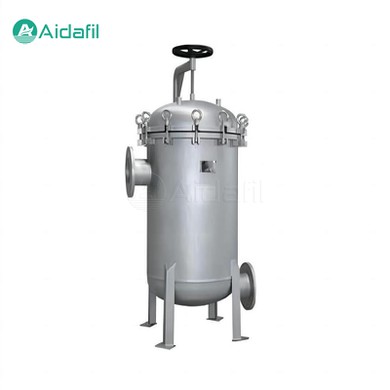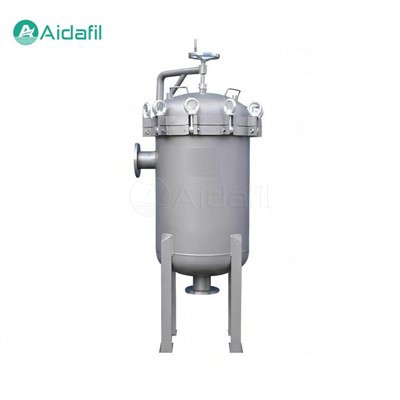
High Capacity Security Filter
The high capacity security filter, as an indispensable part of the field of modern water treatment and fluid purification, plays a crucial role. Its design is designed to effectively capture and remove tiny particles, suspended solids, colloids, microorganisms and other impurities in water or other liquids through precise filtration mechanisms to protect subsequent high-precision treatment equipment.

The high capacity security filter, as an indispensable part of the field of modern water treatment and fluid purification, plays a crucial role. Its design is designed to effectively capture and remove tiny particles, suspended solids, colloids, microorganisms and other impurities in water or other liquids through precise filtration mechanisms to protect subsequent high-precision treatment equipment from damage and ensure the efficient and stable operation of the entire system.
Working principle
The heart of a high capacity security filter lies in the filter media it uses - the filter cartridge. These cartridges are usually made of polypropylene (PP) fiber, meltblown PP, folded filter paper, etc., and have a highly uniform microporous structure, with pore sizes usually between 1 and 50 microns, most commonly 5 micron pore size filter cartridges. As water flows through the filter cartridge, physical interception and surface adsorption work together to trap particles larger than the diameter of the filter pore, while the clean fluid continues to flow forward through the filter pore.
Since the security filter belongs to the category of precision filtration, its working principle is based on mechanical filtration, that is, physical screening is achieved by using the microporous structure of the filter material. As the filtration process continues, impurities will gradually accumulate on the surface and inside the filter element, resulting in a gradual increase in the pressure difference (that is, the water pressure difference between the inlet and outlet of the filter). When the pressure difference reaches the limit recommended by the manufacturer, it indicates that the filter element has reached a saturated state and needs to be replaced in time to maintain the normal operating efficiency and filtration effect of the system.
Structure composition
The construction of the security filter is relatively simple, but the design is ingenious, mainly including the following parts:
1. Shell. Stainless steel is mostly used to accommodate the filter element to ensure overall strength and corrosion resistance.
2. Filter element. It is the core component of the security filter. Filter elements of different materials and pore sizes can be selected as needed, such as PP meltblown filter elements, wire wound filter elements, etc.
3. Seals. Ensure the sealing between the shell and the filter element, and between the inlet and outlet pipes to prevent leakage.
4. Inlet and outlet flanges/fittings. Connect external pipes for easy installation and maintenance.
5. Differential pressure gauge. Monitor the pressure difference before and after the filter to indicate the timing of filter element replacement.
6. Drain port/flush port. Used to discharge impurities or flush the system.
Parameters
|
Filter element quantity |
3-123 |
|
Material |
Cylindrical shell, 304 or 316L stainless steel; Equipped with multiple filter elements |
|
Use |
Used to filter out fine substances after multi-media filtration (such as tiny quartz sand, activated carbon particles, etc.) |
|
Filter flow |
3-246m3/h |
Application field
The high capacity security filters are widely used in a variety of fields, including but not limited to:
1. Drinking water treatment. Ensure the safety and purity of the final drinking water.
2. Industrial water. Cooling water and process water pretreatment in chemical, power, steel, pharmaceutical and other industries.
3. Reverse osmosis system. As a pre-stage protection for the RO system, prolong the life of the reverse osmosis membrane.
4. Swimming pool water treatment. Keep the swimming pool water clean.
5. Food and Beverage Industry. Guaranteeing high Quality Standards for the production of water and products.
6. Semiconductor Manufacturing. Provides pre-purification for high-purity water systems.
Performance characteristics
1. Efficient filtration. It can effectively remove tiny particles and improve the efficiency and stability of subsequent processing equipment.
2. withstands high pressure. The design takes into account stable operation in high flow rate and high pressure differential environments.
3. Easy to replace. The filter element is designed for quick replacement, reducing system downtime.
4. Diversified choice. According to actual needs, the filter material and aperture can be flexibly selected.
5. Strong adaptability. Suitable for a variety of fluid media, including water, solvents, chemical solutions, etc.
6. Easy to maintain. Regularly monitor the pressure difference, replace the filter element as needed, and the maintenance cost is low.
Maintenance
- Regular inspection. Monitor the pressure difference between the front and rear of the filter, record the data, and use it as the basis for replacing the filter element.
- Filter element replacement. Once the pressure differential reaches the set threshold, or the water output decreases significantly, the filter element should be replaced in time.
- Cleaning and maintenance. For some types of filter elements, reverse washing can be used to remove surface impurities and prolong service life.
- Avoid dry operation. Make sure the filter is running with water to avoid dry damage to the filter element.
- System compatibility. When designing the system, ensure that the security filter matches the front and rear equipment to avoid affecting the system performance due to excessive pressure difference.
FAQ
1. Q: What is the function of a filter?
A: The main function of a filter is to remove solid particles, impurities, and harmful substances from liquids or gases, in order to achieve purification, clarification, and protection of equipment.
2. Q: How to choose a suitable filter?
A: When choosing a filter, factors such as the properties of the material being filtered (e.g., viscosity, temperature, corrosion), required filtration accuracy, processing capacity, operating pressure and medium, as well as the type, material, size, and installation method of the filter should be considered.
3. Q: What is the working principle of a filter?
A: The working principle of a filter mainly relies on physical screening, deep interception, absorption, or chemical reactions to remove impurities or harmful components from the material being filtered.
4. Q: How to maintain and care for a filter?
A: Maintenance of filters includes regular cleaning or replacement of filter elements, inspection of seals and fasteners, maintaining stable operating pressure, and avoiding overloading. Specific methods should be referenced from the filter's instruction manual and maintenance guides.
5. Q: What is the service life of a filter?
A: The service life of a filter depends on its working environment, processing volume, and filtration accuracy. Generally, when the filter's pressure drop reaches a certain value or the filtration effect decreases significantly, it needs to be replaced or cleaned.
6. Q: What should be paid attention to during filter installation?
A: During filter installation, attention should be paid to the directionality, ensuring that the fluid enters and exits from the correct ports. Also, the piping system should be cleaned before installation, and the filter should be securely fastened and sealed as required by the instructions.
7. Q: What is the replacement cycle for filters?
A: The replacement cycle for filters depends on their working conditions and filtration requirements, and is usually indicated by pressure difference indicators or timers. When the filter's pressure drop reaches the set value or the filtration effect decreases, it should be replaced in a timely manner.
Why Choose Us
· Professional manufacturer with many years' experience
· Good quality with competitive price
· OEM & ODM are welcome
· Various payment items are acceptable
· Good service by experienced manager
AIDA Philosophy
1. Management Concept:
· Satisfy the customers' demand --- Touch customers, trust with our products and services
· Make employees happy --- Pursue higher material and spiritual happiness
2. Company Mission:
· Focus on customer needs, provide best filtering solution
· To be the lifelong partner with customers
3. Corporate Vision:
· Become a global purification leadership brand
4. Values:
· Customer: Pursue the ultimate experience, enjoy excellent quality
· Team: Trust, responsibility, growth, win-win
· Work: Simple, sincere, efficient, dedicated
Hot Tags: high capacity security filter, China, factory, price, buy, spin on compressor air oil separator, stainless steel fiber sintered metal fiber felt, 3um compressed air coalescing filter, anti block sintered metal fiber felt, Carbon Steel Bag Filter Housing, coalescing filter element against water







